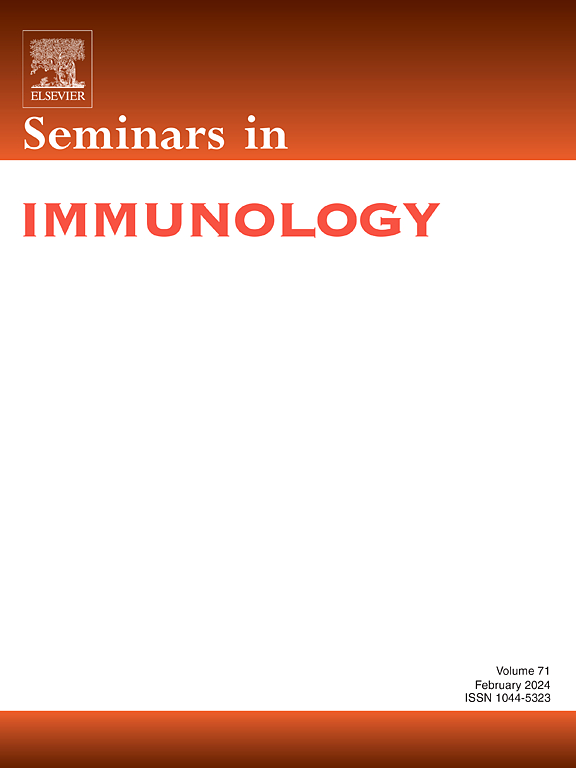聚糖在健康和疾病中的作用:肠道微生物群与宿主免疫系统相互作用的调节器。
IF 7.4
2区 医学
Q1 IMMUNOLOGY
引用次数: 0
摘要
人类肠道微生物群是多种微生物的家园,它们与宿主免疫系统共同进化,宿主与微生物群之间的相互作用对维护健康和平衡至关重要。有证据表明,宿主与微生物群之间的这种共生关系受到干扰,会导致慢性炎症性疾病(包括炎症性肠病)等重大疾病的发生。宿主糖萼(肠道粘膜表面的聚糖/糖链)是肠道粘膜与微生物以及宿主免疫系统之间的主要生物和物理界面。聚糖是微生物群定植的一个重要生态位,因此是宿主与微生物在体内平衡和疾病中相互作用的一个重要调节器。在这篇综述中,我们将讨论肠道粘膜糖蛋白作为调节宿主-微生物群相互作用的重要途径在平衡和健康向炎症转变过程中的作用。我们还讨论了粘膜糖基化重塑作为一种有吸引力的预防和治疗策略在保护肠道稳态方面的作用。本文章由计算机程序翻译,如有差异,请以英文原文为准。
The role of glycans in health and disease: Regulators of the interaction between gut microbiota and host immune system
The human gut microbiota is home to a diverse collection of microorganisms that has co-evolved with the host immune system in which host-microbiota interactions are essential to preserve health and homeostasis. Evidence suggests that the perturbation of this symbiotic host-microbiome relationship contributes to the onset of major diseases such as chronic inflammatory diseases including Inflammatory Bowel Disease. The host glycocalyx (repertoire of glycans/sugar-chains at the surface of gut mucosa) constitutes a major biological and physical interface between the intestinal mucosa and microorganisms, as well as with the host immune system. Glycans are an essential niche for microbiota colonization and thus an important modulator of host-microorganism interactions both in homeostasis and in disease. In this review, we discuss the role of gut mucosa glycome as an instrumental pathway that regulates host-microbiome interactions in homeostasis but also in health to inflammation transition. We also discuss the power of mucosa glycosylation remodelling as an attractive preventive and therapeutic strategy to preserve gut homeostasis.
求助全文
通过发布文献求助,成功后即可免费获取论文全文。
去求助
来源期刊

Seminars in Immunology
医学-免疫学
CiteScore
11.40
自引率
1.30%
发文量
50
审稿时长
89 days
期刊介绍:
Seminars in Immunology is a specialized review journal that serves as a valuable resource for scientists in the field of immunology. The journal's approach is thematic, with each issue dedicated to a specific topic of significant interest to immunologists. It covers a wide range of research areas, from the molecular and cellular foundations of the immune response to the potential for its manipulation, highlighting recent advancements in these areas.
Each thematic issue is curated by a guest editor, who is recognized as an expert in the field internationally. The content of each issue typically includes six to eight authoritative invited reviews, which delve into various aspects of the chosen topic. The goal of these reviews is to provide a comprehensive, coherent, and engaging overview of the subject matter, ensuring that the information is presented in a timely manner to maintain its relevance.
The journal's commitment to quality and timeliness is further supported by its inclusion in the Scopus database, which is a leading abstract and citation database of peer-reviewed literature. Being indexed in Scopus helps to ensure that the journal's content is accessible to a broad audience of researchers and professionals in immunology and related fields.
 求助内容:
求助内容: 应助结果提醒方式:
应助结果提醒方式:


